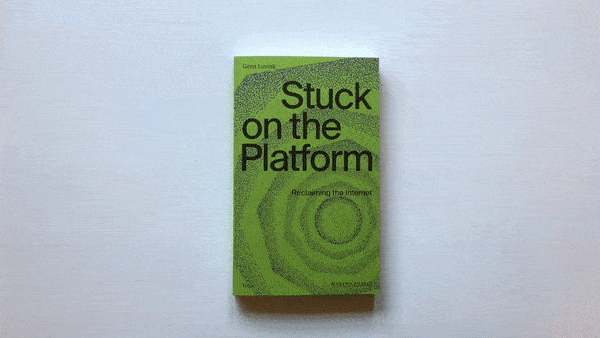
I am proud to present you my new book: Stuck on the Platform, Reclaiming the Internet. The book is published in five languages, starting with English (Valiz) and Spanish (Holobionte Ediciones), followed in August by German (Transcript Verlag), then Italian (Nero) and Turkish (İletişim). The original English edition, published by Valiz (Amsterdam) can be ordered now and found in bookstores. More info here: https://valiz.nl/en/publications/stuck-on-the-platform. The global book launch is in Bologna on May 6, 2022, 6pm, via Pietralata 58.
The blurb:
We’re all trapped. No matter how hard you try to delete apps from your phone, the power of seduction draws you back. Doom scrolling is the new normal of a 24/7 online life. What happens when your home office starts to feel like a call center and you’re too fried to log out of Facebook? We’re addicted to large-scale platforms, unable to return to the frivolous age of decentralized networks. How do we make sense of the rising disaffection with the platform condition? Zoom fatigue, cancel culture, crypto art, NFTs and psychic regression comprise core elements of a general theory of platform culture. In this seventh volume of his net criticism chronicles Geert Lovink argues that we reclaim the internet on our own terms. Stuck on the Platform is a relapse-resistant story about the Brexit-Trump-Covid period (2019-2021), written for doom scrollers with a passion for platform alternatives, built on a deep understanding of the digital slump.
Table of Content:
Introduction: Phantoms of the Platform, or the Internet’s Muddy Enlightenment
1. The Anatomy of Zoom Fatigue
2. Requiem for the Network
3. Exhaustion of the Networked Psyche: Exploring Online Hyper-Sensibilities
4. Stuck on the Platform: Notes on Online Regression
5. Minima Digitalia
6. Delete Your Profile, Not People: Comments on Cancel Culture
7. Crypto-Art Annotations and other MoneyLab Findings
8. Principles of Stacktivism
Conclusion: Reconfiguring the Techno-Social
From the introduction
During the lockdown misère we’ve literally been stuck on the platform. What happens when your home office starts to feel like a call center and you’re too tired to close down Facebook? “How to get rid of your phone? Wrong answers only.” We wanted to use the pandemic to reset and move on. We failed. The comfort of the same old proved too strong. Instead of a radical techno-imagination focused on rolling out alternatives, we got distracted by fake news, cancel culture, and cyber warfare. Condemned to doom scrolling, we suffered through a never-ending barrage of cringy memes, bizarre conspiracy theories, and pandemic stats, including the inevitable flame wars surrounding them. Random is fun.
“We admitted we were powerless—that our lives had become unmanageable.” This confession is Step 1 in AA’s 12 steps, and it is here that Stuck on the Platform also begins. As you and I are not able to resolve platform dependency, we remain glued to the same old channels, furious at others about our own inability to change. In this seventh volume of my chronicles, we’re staying with the trouble called the internet, diagnosing our current phase of stagnation while also asking how to get “unstuck” and deplatform the platforms.
What happens to the psycho-cultural condition when there’s nowhere to go and users are trapped in too-big-to-fail IT firms? It’s not pretty. While some believe that our persistent resentment, complaints, and anger are merely part of the human condition, totally unrelated to the shape and size of the information ecology, others (like me) are convinced that we have to take the mental poverty of the online billions seriously. We can no longer ignore the depression, anger, and despair, pretending they will be gone overnight after installing another app. Addiction is real, buried deep inside the body. Habits need to be unlearned, awareness needs to spread. All the while Godot just sits there, staring at the screen, waiting in the lobby for some policy change to be announced. Yet nothing ever happens. The resulting fallback and fatalism comes as no surprise. “What do you do when your world starts to fall apart?” Anna Tsing asks at the very beginning of The Mushroom at the End of the World. It seems we have our answer: we stick to the platform.


